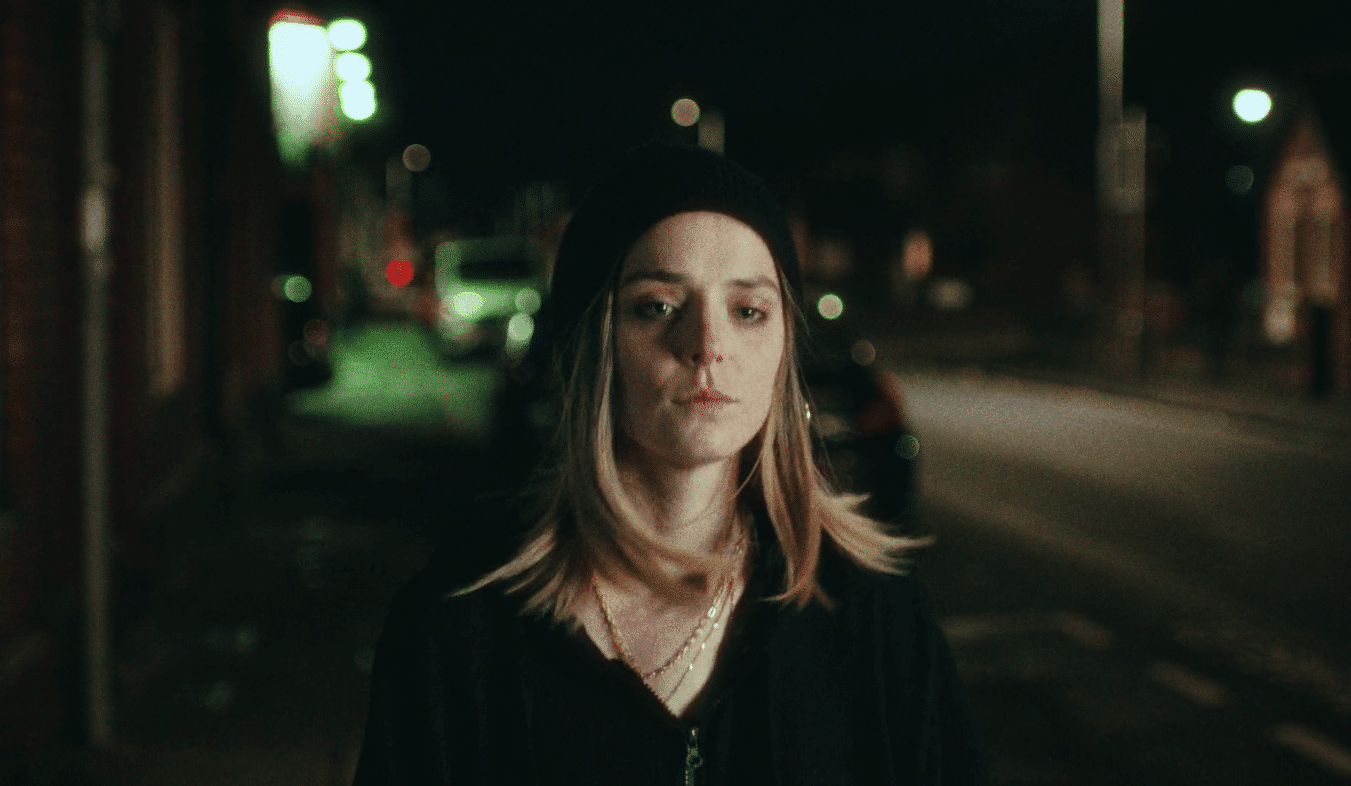
By Gabby Foor and Keri O’Shea
We are rounding off our coverage of Fantasia for this year with another block of short films; this time, the uniting factor is that all of these films were directed by a female director. There’s no one genre uniting these films per se, although there do seem to be some horror or dystopian elements in common: this could be the luck of the draw of course, or it could be to do with the fact that genre film is so open to the imagination, and such a good starting point for filmmakers hoping to establish a recognisable style or direction. Anyway, without further preamble, here’s our take on the eight short films which comprise this year’s Born of Woman block.
We start with Sayani (dir. Lucia Bernal). Stark, bright, quiet and alone. In some distant future, Bernal has created a barren, mesmerizing world for a lost pilot to navigate. With complete command over lighting, visuals and the creation of another space, Bernal lands us in a hopeless situation with a singular hero who has little hope of returning home. Initially bathed in dark with red lights, a pilot surveys her surroundings on a barren planet. In what seems like memory, we are suddenly bathed in light, and a mysterious, shadowy figure presses itself against the sheet-like material surrounding our pilot in her dreams; she welcomes it. As this memory fades, she awakens, injured, alone, with no supplies or ship. The pilot (Andrea Bonutto), attempts to radio for help, saying she is “Lost in place two.” She is “in a white place” now and is requesting return coordinates, but the radio returns nothing but unintelligible voices and static. The pilot begins to trek across the dry, pale land, and as she does, memory and visions begin to present themselves, seemingly leading her towards her destination.
This film has little dialogue and relies on careful attention to every memory and presentation. Our pilot is a lost but determined woman, following signs from her own personal journeys and potentially from beings with larger knowledge. This movie is an expressive exploration of memory and the unknown driven by a harrowing solitary journey. Bonutto plays the hard-faced, determined pilot well even without much to be said, her facial expressions and movements belying the difficulty of her journey and her eyes lighting up to the sights and sounds of the strange environment and in reaction to her own personal memories. The film itself is stunning to look at, with cinematographer Valentin Alvarez Sabouret using all the power of the camera to create a sense of vastness. Powerful lighting and the lack of sound emphasize loneliness; even when signs of other beings make themselves known, it’s clear that help might just be too far away.
A visual delight and a quiet, emotional journey to a shocking end, Sayani asks for ten minutes of patient attention to the reckoning of a solo traveller. While not an action packed or dialogue filled short, the visuals and our lead guide you on a journey that opens up your mind to the unknown and the tragic. Sayani sparks imagination and wonder, with a sense of mystery that follows you all the way to its uncertain and surprising end. [GF]
I wasn’t sure if I should weep, laugh, be horrified or rejoice during Se Dit d’un Cerf Qui Quitte Son Bois (Said of a Deer That Sheds Its Antlers) (dir. Salomé Crickx). It’s a film that rides the line of black comedy and new, terrifying if somewhat comedic dystopian rituals. Here is a world where the young are given a chance to shape their future, if they’re willing to do what it takes to change it. Dubbed one of the most subversive comedies to come out of Belgium, this movie is a frenzied short ride. It’s the 167th Annual Moult. Beginning in the woods, a young woman, armed and appearing to be a sentry, is guarding one of her town’s roads. She suddenly sees an old woman, fleeing down the path and whistles to stop her, intercepting her. She asks where she’s going, and strangely, asks her to specify her age. The older woman says she’s looking for her daughter; the sentry asks her the daughter’s name, and if she would be willing to wait for her there, levelling the gun as the woman makes twitchy steps to escape the interaction. Over the hill we hear shouting, and another young woman, the old woman’s daughter has arrived, also with gun in hand. The two younger women chat, thanking the sentry for catching the fleeing woman. The daughter gives her mother a quick kiss and a cheerful goodbye, before taking her own weapon and shooting her mother in the head. I suppose festivities are in full swing.
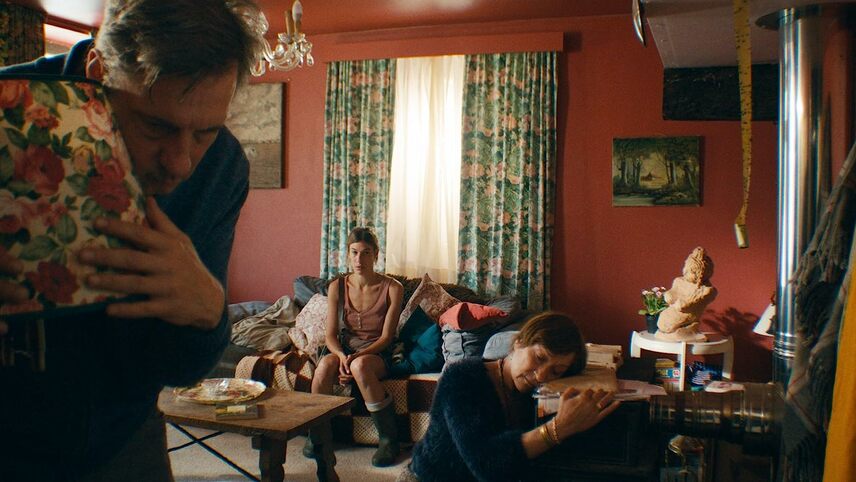
With themes that mirror some of the ideas in Midsommar, Crickx puts the power of change in the hands of the young and takes some of the horror out of cult-like practices with moments of levity and a message of progress. Solemn parents pouting and running like children in the face of change very much mirrors some of the frustration sometimes felt, that the elderly cling to their ideas and refuse change or the ascendance of new blood. The festival itself, while a brutal hunt and a theoretically emotional experience, appears to be catharsis for the younger generations of the town as they exercise their new freedoms and celebrate the possibility of the rise of new ideas, customs, and genius from the potentially stifled voices of those deemed too young to have a voice yet. Over the top songs for the soundtrack and celebratory folk songs are all comedic lifts to a tragic, but seemingly necessary series of events that has become the norm for new generations. Crickx pulls no punches in saying what she believes the future may become if we don’t give new lives chances to thrive. With strong female performances that show both women and “children” can take the helm, this film is a dizzy, interesting and darkly witty look at how the young might take to changing the world. [GF]
In Only Yourself To Blame (dir. Noomi Yates) a woman walks home alone at night: this can feel like horror enough if you are a woman, thinking of the seen and unseen potential dangers. Yates takes this already intimidating set-up and adds in darker layers. A girl (Severine Simone) is escorting her drunk friend to a taxi at the end of a long night. After putting her friend in the vehicle to judgmental male eyes only concerned if the drunk girl will soil his taxi instead of getting her home safely, the girl makes her way home, cloaked in black and surrounded by paranoia. While most of it seems like the usual late-night riff raff, breaking bottles, rowdy boys, and urban surrounding sound, suddenly the paranoia escalates and the camera angle shifts to give us that very real feeling of someone standing over our shoulder. For our girl, this is the case, but it’s no average stranger or stalker; this person or thing is imitating her every move, and it’s in pursuit.
Fitting into a few genres here, this gave me vibes of Watcher, that someone is truly there menacing you but you can’t get a firm grasp on them. The camera work, flashbacks and use of imagery, especially at its climax, was incredibly well done as the tension ratchets up during this sojourn home. Yates takes an already frightening experience and adds in nuance with brief but impactful and heartbreaking glances of trauma that may be driving this intense fear, suspicion and desperation. Her horrifying but not over the top depiction of trauma is enough to give you the idea that as a victim you are constantly wondering what could happen to you next. This safety instinct is seen in her trying to get her friend home safely first, eyeing up the cab driver and making certain that another fellow female won’t end up in the wrong hands.
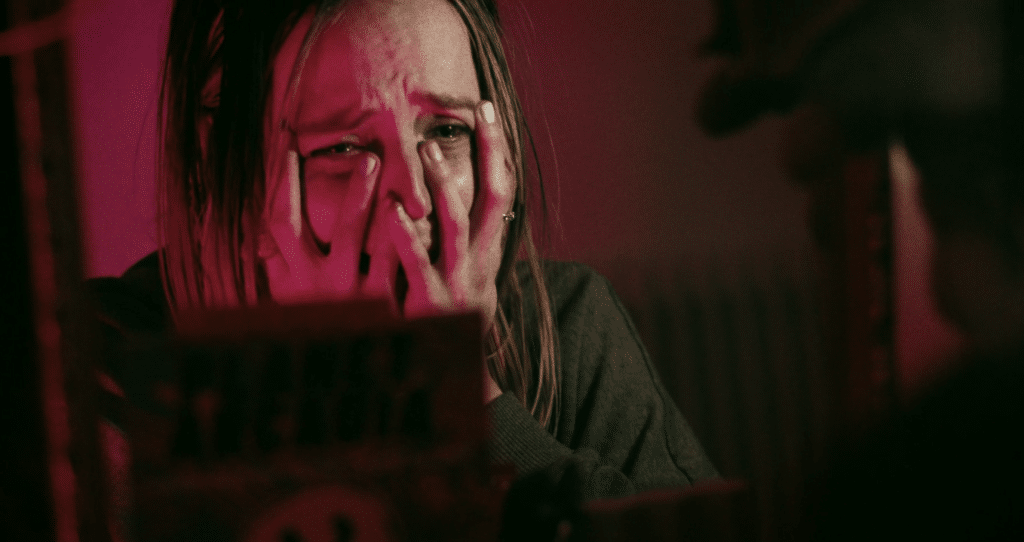
Metaphors and messaging show that victims tear themselves up literally and figuratively, beating and blaming themselves in one instance and trying to find consolation in the next. Women from all backgrounds can put themselves in these shoes: the dance of trying to stay safe, the dance of blaming yourself for feeling that way, and the punishment that when things do go wrong that you could have done something different. This shifting, mimicking creature that stalks our main character is a mockery of her every move and an assault (and occasional comfort) to her being, showing how twisted and split (in some cases here literally) we can become after life shattering instances of revulsion. I think this is a powerful victim statement and a message to women to be kinder to themselves in the face of terror they did not generate. However, with its ending leaving us to wonder where our protagonist will end up, it is hard to say where these feelings will lead us after the credits: victim, or survivor? [GF]
Sweet Tooth (dir. Joséphine Darcy Hopkins) is a testament to a truth I’ve known all my life: girls can deliver the most well-crafted cruelty. Returning to Fantasia for the third time, Hopkins brings a tale of young girls caught in a game. A young girl, Madeleine (Lou Deleuze) is happily on her way to a work appointment with her mother. A beautician by trade, her mother is headed to an enormous mansion to tend to a few wealthy clients. When the two arrive, a servant immediately whisks Madeleine away to the basement, where the other women’s children are deeply involved with a board game. The three girls, led by the charismatic, sharp eyed Eugénie (Katell Varvat) invite the shy girl to join them in The Queen’s Game where the goal is to reach the castle in the center by taking turns spinning a wheel and drawing cards. The catch is these girls come from real money, and judging by the house, it is no large matter to them. The game requires a real cash buy-in, and with only a coin to offer, Madeleine is already trailing the other girls with the money she has to use. As the game goes on, and the girls get more vicious as they approach the win, money becomes an issue for Madeleine. No problems though, as Eugénie has a work around and suggests a bargaining or trading system that would count as credit. However, this trade off won’t be painless if Madeleine hopes to continue.
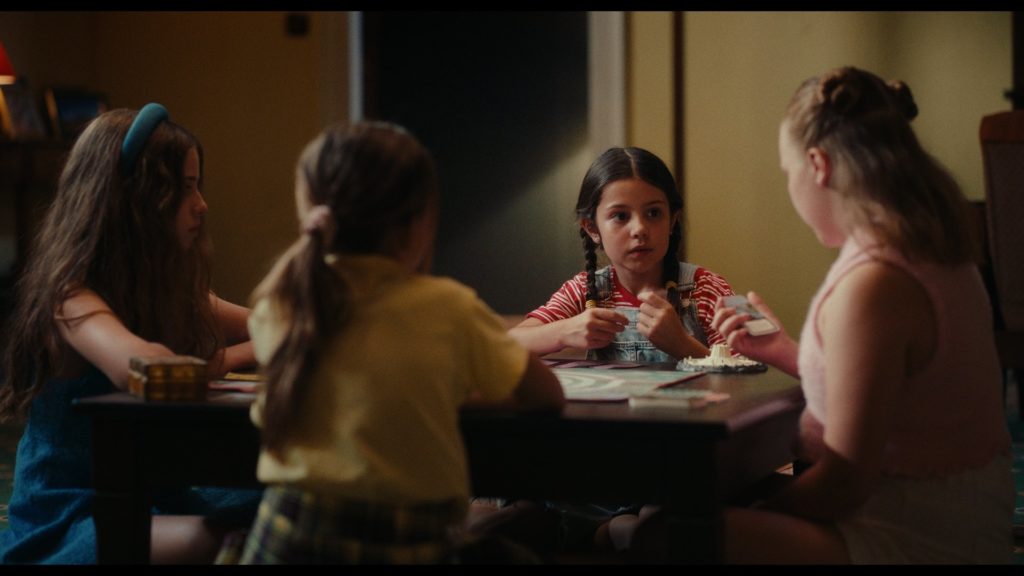
This story is a chilling experience driven by talented young performances and a strong story with dark overtones. Katell Varvat, my new favorite young performer and the star of another short at Fantasia this year, Transylvanie, is as charming as she is manipulative, at times stealing the spotlight from those around her with her devilish portrayal of the brutal ring leader of young girls. Lou Deleuze is pulling her weight here as well with the rapid evolution of Madeleine as a character. Her innocence turned to desperation, which eventually solidifies into stone faced determination, is an intense development throughout the film’s runtime. The psychological thrill of the game, the gruesome bargaining system introduced, and the overtones of class warfare keep tensions high throughout. You’re consistently rooting for this underrated young girl to overcome the forceful, personal bullying to see some compensation, or at least vindication. This short is an excellent entry into the horror and psychological drama genres, driven by mesmerizing characters and careful writing. With an ending that is equal parts sad and satisfying, Sweet Tooth is an engaging short with a committed, convincing cast working at multiple levels. I was shocked and charmed repeatedly throughout and was thoroughly invested in the outcome of a children’s game. Hopkin’s film is a must see for the performances alone, as well as a horrifying, heart breaking story of how deep malice can run regardless of age, and what some children are willing to do in order to connect with their peers, or suffer the punishment of isolation. [GF]
The Taster (dir. Sophia Bierend) is relatively long for a short film at around the thirty minute mark, but in that time it develops an intriguing close focus on a character who would, in most cases, remain invisible. The Taster is somewhat dystopian, but its focus on a Europe ravaged by climate change which has rendered the Danube Delta one of the only remaining fertile zones (and as such something for various military factions to fight over) feels awfully close at hand. In its world – and the film does a great job at building a world – the vast majority of the population no longer has access to food and resources; only the powerful. i.e. those engaged in military conflict, can hope for such things.
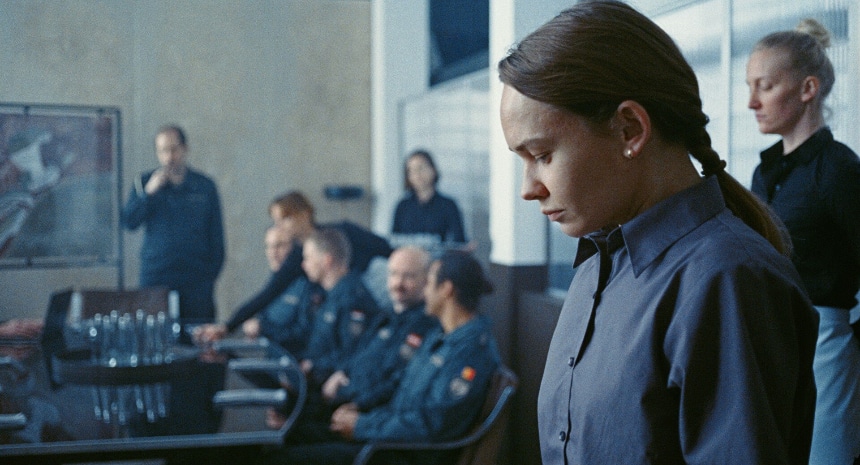
Into this mix is thrown Ozana (Silvana Mihai), who has been given an important new job: chief taster for a commander paranoid about assassination attempts via poisoned food. We see her arriving at the base, being mocked by a vehicle-load of laughing, mocking soldiers, who first offer her something to eat and then pelt her with it. She reacts angrily; she may be powerless by many of the most obvious measures, but there’s a spark in her which resurfaces later. Arriving at a base, she reports to Diana (Andreea Sovan) who fills her in on her forthcoming role: she must taste everything which is to be eaten by the mysterious commander. In the meantime she must not look at him, address him, or befriend any of the cooks at the base. This is something which quickly becomes challenging for Ozana.
In the film, food itself has become a dangerous, politicised, even intimidating substance (Ozana has not eaten anything solid for two years, having access only to some kind of nutritive mash). And the idea of an official taster is no myth: throughout history, and now no doubt, powerful people worth poisoning have relied on some subordinate to reduce their risk. We rarely hear from these anonymous people, however: Ozana is different because she is not anonymous, and in fact we see her navigating her position carefully: she is sympathetic, isolated, suppressing her curiosity beneath her fear, unfamiliarity and a sense of foreboding. The dynamics of sight and seeing are as important as the dynamics of consumption. Furthermore, the film’s quietly-brooding powerplay is well construed, picking out a key detail from this dystopia and examining it. I also appreciated the film’s eye for detail, such as in its code-switching between English and Romanian: this in itself points to important ideas about duty and personally-held ideas. [KO]

Pruning (dir. Lola Blanc) focuses on the host of a webcast titled ‘Free Thinker’, this being a young woman named Sami Geller (Madeline Brewer). Sami, a right winger, rails against radical leftism in her broadcasts, advising that America needs to “prune” the “rot” in its midst (language which has genuinely been used in political life; EU diplomat Josep Borrell has used similar terminology very recently). Geller is a plausible demagogue in a world of increasingly polarised, contentious political commentary. But, offline, she’s very different: a nice neighbour; a concerned and self-conscious woman. When she discovers that a recent mass shooter has namechecked her as an inspiration – even using the same rhetoric – she is genuinely alarmed. But, as the film begins to cede to more fantasy and nightmarish elements, we see Geller struggling between person and persona, framed as she is by a world of clicks and likes. Whilst the question of personal responsibility is mooted but left hanging (largely by necessity, given the film’s modest runtime) this is a well made and conceived film, with disorienting, clever framing, earnest performances and some genuinely horrifying imagery. [KO]

Nian (dir. Michelle Krusiec) has a runtime of just six minutes or so; as such it’s a brief glimpse at Chinese folklore (which many Western audiences still know very little, this reviewer included) framed via a little girl’s run-in with an odious bully (setting up said odious individual for a takedown, but making it trippy good fun). Gertie (Lauren Mei) has a Chinese demon mask (reminder: they ward off demons) and she has brought this family heirloom into school for a Show and Tell session. By the way, grandma, who drops her off at school, is an instant hit with her lively turn of phrase. When a girl in her class isn’t exactly receptive to this glimpse at Chinese heritage, things go down: there’s just enough set-up and denouement here to hold everything together, and the film looks great, with some wonderful lighting and editing choices. [KO]
Sticking with the folkloric horror, but painting a far more complex picture is Mancha (‘Stain’) (dir. Nikki Mejia). Things start quietly as a little girl moves through a beautiful, snowy landscape; it changes when she glimpses a man, seemingly unbothered by the bitter cold, observing her. Something in her makes her run; or does it? Whose dream is this? Is it a dream at all?
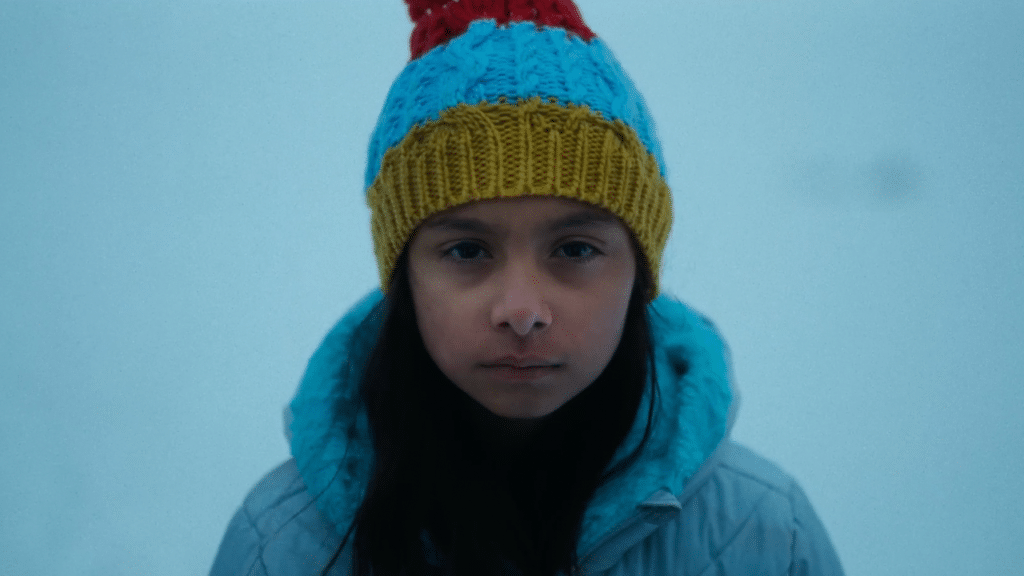
Via this opener, we meet three generations of the same family: grandma Natalia (Marlene Forte), mother Cory (Marisé Álvarez) and daughter – the little girl – Lucy (Elizabeth Phoenix Caro). Grandmother and mother work in a Latin restaurant, and there’s some disarming family chatter before the next shift starts; clearly, this is a loving family unit. But something else unites these women; what? Mancha hands around its focus between its different characters, moving from Lucy to Cory and back again. As it does this, a creeping strangeness takes hold: the vision of the man is linked in some way to a vision of a literal ‘stain’ spreading across the bodies of the women. Ultimately, it falls to Cory to take the weight of this burden, working to try and protect her young daughter. Clever edits and shots build a stark contrast between the icy world outside and the warm, inviting – but increasingly heady, if not fully expounded, unreal world inside. [KO]
